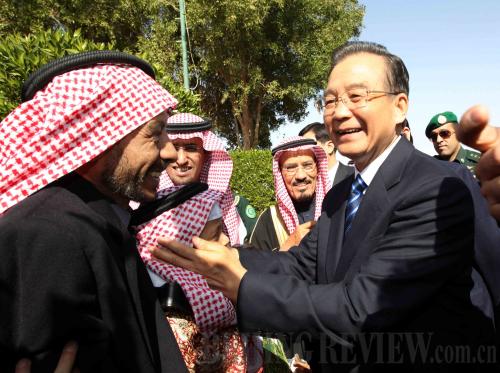|
 |
|
FAMILY VISIT: Chinese Premier Wen Jiabao talks with family members of Abdul Rahman Al-Jeraisy, President of the Saudi Arabia-China Friendship Association, as he visits Al-Jeraisy's manor on the outskirt of Riyadh on January 15 (LIU WEIBING) |
Chinese Premier Wen Jiabao visited Saudi Arabia, the United Arab Emirates (UAE) and Qatar, and participated in the Fifth World Future Energy Summit (WFES) from January 14 to 19. The Chinese premier stated China's stance on world energy supply at the summit and called for strengthening comprehensive cooperation with the three nations, including energy cooperation.
Wen clarified China's stance on energy security and sustainable energy in his speech at the WFES on January 16 in Abu Dhabi. China advocates energy security for all—producers, consumers and dealers, said Wang Haiyun, a researcher on energy security studies at the China Foundation for International Studies. All these stakeholders should enhance coordination in the face of possible energy security challenges, he added.
China urges the world to work together to secure a safer and more stable and sustainable supply in the global energy market, the Chinese premier said.
The WFES, a global platform launched in 2008 for sustainable future energy solutions, gathered industrial leaders, investors, scientists, policymakers and researchers to discuss challenges of rising energy demand and actions to achieve a cleaner and more sustainable future for the world.
Wang said China should work together with other emerging economies and developing nations to reach a consensus on establishing a global energy market management mechanism. Such a mechanism would benefit most countries, and would be widely supported, he said.
Wang pointed out that one important aspect of China's energy policy is to ban international energy speculation, which results in sharp fluctuations in the international energy market. He stressed that financial speculation is causing major damage to the global energy market. For example, about 30 percent of crude oil price growth in 2011 was caused by financial speculation.
Wang echoed Wen's calls to maintain peace and stability in energy-producing countries. Wang said all countries should make efforts to that end, because world energy producers' peace and stability concern the energy security of the whole world.
"We cannot ignore West Asia and North Africa's special status and functions. And we must stop spreading neo-interventionism in this region," Wang said. The region contains 50 percent of the world's oil reserves and 40 percent of its natural gas reserves.
"Any extreme acts across the Strait of Hormuz, under whatever circumstances they are taken, are against the common interests and aspirations of the people across the world," Wen said at a press conference during his official visit to Qatar.
Currently, the Strait of Hormuz is the most important shipping lane for oil producers in the Middle East, including the UAE, Qatar and Saudi Arabia. Iran has said it might block the strait in response to possible security threats from the United States.
While deepening China's relationship with the three Gulf nations, Wen's visit helped improve China's relations with the whole Islamic world, said Qu Xing, President of the China Institute of International Studies.
"The significance of this visit is far beyond the energy aspect," Qu stressed.
| 